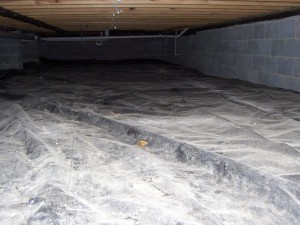I was doing some work recently for a novice property investor and he was asking me some questions about FHA required repairs. He wanted to prepare the house he just purchased so that if the buyers were going to use FHA financing there wouldn’t be any issues at the last minute to hold up the closing. I told him that was very insightful, especially since I’ve seen seasoned investors not even consider this and then at the last minute need to make changes or additions to the property before it would close. By planning ahead this can save time and allow the loan to close without a hitch as well as save the buyer money in unnecessary final inspections from the appraiser.
The two items we were talking about involved vapor barrier in the crawl space and deck stair railings. It’sunderstandable  that he was confused because these are two issues that HUD changed several years back. Vapor barrier, or the black plastic sheets that you sometimes see in the crawlspace of homes, was once an FHA requirement. The vapor barrier provides protection against ground moisture and the possible build up of mildew in the house. It is now not necessary to have this. Some people still use it, but they don’t have to, and it will not be a repair requirement in the appraisal.
that he was confused because these are two issues that HUD changed several years back. Vapor barrier, or the black plastic sheets that you sometimes see in the crawlspace of homes, was once an FHA requirement. The vapor barrier provides protection against ground moisture and the possible build up of mildew in the house. It is now not necessary to have this. Some people still use it, but they don’t have to, and it will not be a repair requirement in the appraisal.
The next item was stair railings. As was the case with the vapor barrier this was a required repair. It does not require automatic repair now unless it poses a safety hazard. If you have stairs that are 3 or 4 risers high then it should not be an issue, however something 8-9 high is another story. The appraiser will report it and then lender discretion and prudent underwriting will determine if the repair is advisable. I think FHA took a look at their requirements several years back and compared it to the requirements of other forms of financing and decided to ease the requirements a little. They are still concerned about the three S’s: Safety, Soundness, and Security but have backed off of their very strict repair requirements. If you’re not sure what these are and how they relate to MPR’s you can read another blog post I wrote here.
and compared it to the requirements of other forms of financing and decided to ease the requirements a little. They are still concerned about the three S’s: Safety, Soundness, and Security but have backed off of their very strict repair requirements. If you’re not sure what these are and how they relate to MPR’s you can read another blog post I wrote here.
Are you an investor that has an FHA question? Are you a seller and want to know what has to be done to a house for it to qualify for FHA financing? Please give me a call and I would be glad to talk with you about this.
If you have any real estate appraisal related questions you can call me at 205.243.9304, email me, or connect with me on Facebook., Twitter, or Youtube.
We had a house inspection and the house inspector sited some “safety issues” such as ungrounded outlets, high radon level, mold in attic. Are these issues that need to be fixed before selling to an FHA loan?
This was not the FHA inspector but a private house inspector.
The appraiser is not required to perform the level of inspection that a home inspector would, however, if we see obvious signs of problems we are required to note it so that it can be fixed.
Yes, they are. Loans using FHA/HUD funds are concerned with the safety of both the occupants and the value of their collateral.
Would a natural gas burning fireplace connected to the city’s source of natural gas that is installed in the livingroom be an approved source of heat for a small 2 br brick house in Florida?
As long as it can provide the minimum allowable temperature and be self-regulating it should be fine. Also, it must meet city building codes.